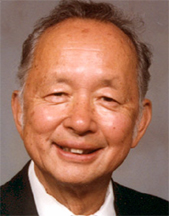1926 – 2002
One of the world’s leading authorities on race and ethnic relations
Harry Kitano has been described as “one of the most influential teachers at UCLA and, for more than 30 years, students as well as faculty colleagues sought his sage advice often delivered with a dose of wit and humor.” He freely offered his strong shoulders upon which many social workers and Asian American scholars could seek a more civil society for all.
The bombing of Pearl Harbor on December 7, 1941 had a profound and everlasting impact on Kitano who was a fifteen-year-old high school freshman living with his parents and 6 siblings in San Francisco. Soon after the bombing, his father was picked up and questioned by the FBI. His family was then ordered to leave their home and transferred to the Santa Anita race tracks in Arcadia, California where they lived in a horse stall for six months, and then to the Topaz concentration camp in Utah where they remained from 1942-1945.
The author of over 150 books, articles and reports spanning over four decades, Professor Kitano was a pioneer in the social scientific approach to understanding the contemporary Japanese American population, and in providing theoretical frameworks for understanding persistent and new patterns of racial and ethnic conflict, cooperation, and interactions. His first book, Japanese Americans: The Emergence of a Subculture,(1969) was the first in-depth sociological analysis of the Japanese American experience. It remains a standard in the field, has gone through three editions, and has been translated into many languages, including Japanese. The book catapulted Katano to celebrity status in both the academic and public arenas, and he became a well sought out speaker and commentator.
Spending his entire professional career at UCLA from 1958 through 1995, Kitano was a faculty member in the departments of Social Welfare and Sociology. Twice serving as the acting director of the UCLA Asian American Studies Center, the nation’s largest and most comprehensive program of its kind, he was an active member of the center’s Faculty Advisory Committee even during his retirement years. He was a Visiting Professor at many institutions including the University of Bristol in England, Yamaguchi University and the International Christian University in Japan, and the University of Hawaii at Manoa. He also received many grants to support his research over the years.
On May 6, 1997, Kitano and other Japanese American students who were removed from San Francisco public high schools because of President Roosevelt’s Executive Order 9066 were finally awarded their high school diplomas. The keynote speaker, Kitano remarked with a chuckle, “I do things backwards. I got my Ph.D. first and then I got my high school diploma.”
